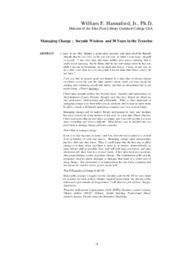| dc.description.abstract | I came to see that, though a great many persons, and most of all he himself, thought that he was wise, yet he was not wise, so when I went away, thought to myself, "I am wiser than this man: neither of us knows anything that is really worth knowing, but he thinks that he has knowledge when he has not, while I, having no knowledge, do not think that I have. I seem, at any rate, to be a little wiser than he is on this point: I do not think that I know what 1 do not know." I tell you that no greater good can happen to a man than to discuss human excellence every day and the other matters about which you have heard me arguing and examining myself and others, and that an unexamined life is not worth living. (Plato's Apology) I have often thought of these two Socratic dicta - humility and examination/as the foundation of early Platonic thought, and they have helped me blend my two professions, librarianship and philosophy. What is most important in managing change is to know when you do not know and to keep an open mind. In effect, remain a bit humble and always examine your own revered truths. Managing change well in today's library environment is vital, and Socrates has always been one of my mentors in this task. As a five-time library director, I have seen more than my fair share of change, and lean tell you that it is most often rewarding and always difficult. What follows can be divided into two parts: how to manage change and some examples. Part I How to manage change If one is to take Socrates seriously, and I do, then one has to admit to a certain level of humility in what one knows. Managing change often demonstrates just how little one does know. Thus, I would argue that the best way to effect change is to have vision and then to share it, to involve, democratically, as many library staff as possible. Your staff will help keep you honest, and open discussion will often lead to a revised vision. It has often been my experience that group dialogue results in positive change. The examination of life and the workplace involves public dialogue, a dialogue that leads to a better way of doing things. The alternative is to impose from the top down, assuming that one knows all, and this rarely, if ever, works well Part II Examples of change in the US Many of the changes wrought over the last fifty years in the US are now taken for granted, but each of these changes required great vision, the sharing of this vision and a fair amount of disagreement. I will discuss a few of these changes, listed below. Proactive professional organizations (ALA, ACRL), Inventory control systems, Library utilities (OCLC, Nelinet), Serials indexing, Professional library master's degrees, Faculty status for librarians, Digitizing | en |
